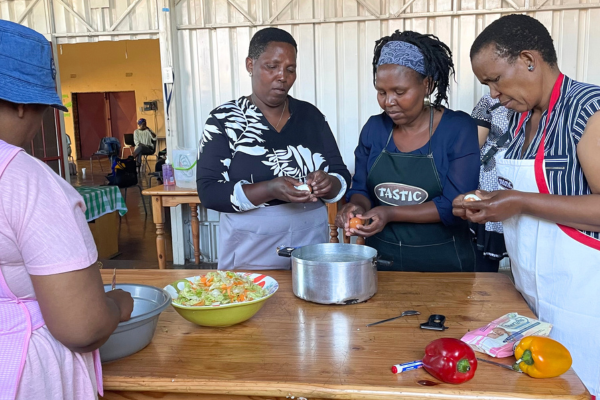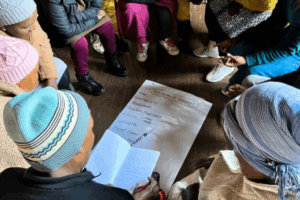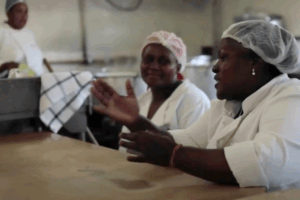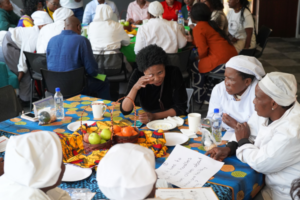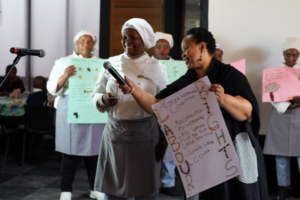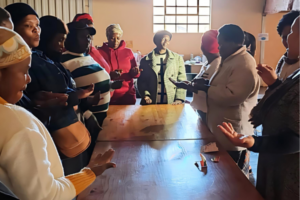Volunteer Food Handlers discuss NSNP issues, food sovereignty, and better working conditions at an LRS feminist safe space.
This Women’s Month - 30 years since the end of apartheid - demands meaningful change. We need to shift from words to action. Recognising the work of the women who feed the learners in our communities is a powerful starting point.
At the opening of Parliament on 18 July, President Cyril Ramaphosa recognised that inclusive economic growth “demands that we affirm the position of women and youth in the economy”. In the face of the gender-based injustices entrenched in our society, this aspiration is a bold affirmation of our resolve to create a more just and equitable society for all women.
However, this Women’s Month — 30 years since the end of apartheid — demands meaningful change. We need to shift from words to action. Recognising the work of the women who feed the learners in our communities is a powerful starting point.
Unlocking the full promise of the school nutrition programme
The National School Nutrition Programme (NSNP) has come a long way since its 1994 initiation as Nelson Mandela’s flagship presidential project to becoming a game-changing policy intervention that bridges the nutrition gap for under-served learners.
Through this programme, more than 10 million learners benefit from school meals and it is linked to significant improvements in school attendance and academic achievement, especially among learners who attend schools in rural communities.
For many learners, the food they eat at school is the only full, nutritious meal they receive daily. Despite its ongoing challenges, the NSNP has also been a powerful gender equality intervention through alleviating the burden on caregivers (at least 92% of whom are women) and breaking down barriers for girl learners to attain education.
Despite the NSNP’s remarkable strides in redressing our socioeconomic challenges, it also mirrors the entrenched inequalities that hinder our nation’s progress and potential for prosperity.
Challenges in the programme — including funding disbursements, procurement hurdles, late service delivery and delayed payments to service providers — are persistent and widely acknowledged.
However, what often goes unnoticed is the work of the women who feed the learners in schools. Their significant contributions and experiences, which are essential to the programme’s daily operations, are neglected. The invisibility of women’s work — especially our care work — limits our potential to drive sustainable, economic growth and instead perpetuates gender inequality.
Food handlers are misclassified as volunteers
The International Labour Organization aptly defines the care economy as the vital sector that underpins human wellbeing and sustains life. Volunteer food handlers — women who are mothers or guardians of learners — form part of the care economy as they prepare and provide nutritious meals that support human health and promote the dignity and quality of life of indigent learners.
Moreover, the work of the food handlers extends beyond preparing food; their care work involves social interaction, emotional support and community building, all of which are essential for learners to feel engaged and motivated, and develop a love for learning and school.
Unfortunately, like other forms of care work, this work is economically undervalued, which perpetuates poor working conditions, low pay and limited social protection, leaving the food handlers feeling vulnerable and disenfranchised.
Despite the programme’s three-decade span, the women spearheading the initiative remain classified as “volunteers”, even though they have formal two-year contracts, pay UIF contributions, and work for up to six hours a day with clear job descriptions and responsibilities.
The contracts they sign are rigorously regulated and reflect closely supervised duties and correctly include a Code of Conduct, given the nature of this work.
Moreover, according to the Department of Labour’s Code of Good Practice: Who is an Employee?, an individual is considered an employee if they have worked for an employer for an average of at least 40 hours per month over the preceding three months.
Food handlers report working up to 120 hours per month over 24 months. Their exclusion from employee status and benefits is further compounded by their designation as volunteers, which perpetuates the systemic oversight of their invaluable care work and contributions, effectively rendering them invisible.
How are food handlers compensated for their labour?
In South Africa, about 61,000 volunteer food handlers, mostly mothers of pupils, play a vital role in providing school meals. However, their dedication is met with a modest monthly stipend of only R1,360 to R1,840, underscoring the disparity between their valuable contributions and the compensation they receive. The handlers also struggle to access their UIF benefits, leaving them even more vulnerable and without a vital safety net.
Compensation for the food handlers comes from the Expanded Public Works Programme’s social sector line item, which has seen significant budget cuts (before accounting for inflation) over the past few years.
In the cost-containment measures implemented ahead of last year’s Medium-Term Budget Policy Statement, this programme’s budget was adjusted downwards from February 2023/24’s R426.48-million to November’s R395.91-million — a 7.2% budget cut before even accounting for inflation. Alarmingly, the 2024/25 budget has proposed a massive 22.8% cut to this programme’s funding.
By contrast, the NSNP’s budget has generally increased above inflation each year and tends to be pegged to food inflation and rising demand for the intervention, a move civil society has welcomed. While the NSNP’s reach grows each year, meaning more learners to feed, the value of the food handlers’ labour dwindles — they are expected to do more with fewer resources.
Our national budget is not just a financial document; it is a reflection of our government’s values, priorities and vision for the future. If the government seeks to contribute to building a society that values women’s work, it must allocate adequate resources and support for food handlers. These dedicated women serve as a buffer against the harsh effects of resource scarcity on learners, even going as far as to dip into their own limited finances to ensure the learners’ needs are met.
Budgeting with a gender lens can reverse these inequalities
Civil society has hailed the National Treasury’s commitment to a Gender-Responsive Budget as a major victory for gender equality. As the upcoming Medium-Term Budget Policy Statement takes shape, this commitment must be translated into concrete action.
This could be a vital opportunity to shine a light on the crucial role of these food handlers, mostly women, and work towards a more equitable allocation of resources that recognises their tireless efforts.
While fiscal constraints are a reality, we must address the deeply profound issue of women’s work being consistently undervalued and underpaid. It’s essential to recognise and remunerate their contributions fairly, rather than perpetuating a system that assigns lesser value to their efforts.
____________________
Matshidiso Lencoasa is a budget researcher at SECTION27 and chairperson of the Budget Justice Coalition. Nina Benjamin is the gender programme coordinator at the Labour Research Service (LRS).
This article is republished from Daily Maverick. View the original article.
GOOD VIBE: “Jabula” – a song by Volunteer Food Handlers expressing their commitment and passion for ensuring learners receive the nutrition needed to thrive in school. ‘Jabula’ means to rejoice, to be happy.”
Know more about the campaign advocating for recognition and rights of Volunteer Food Handlers as workers under the NSNP.

